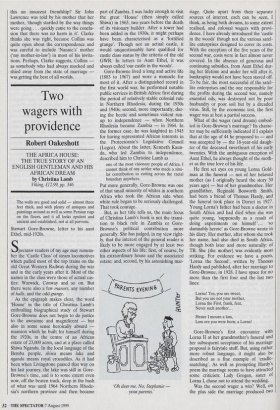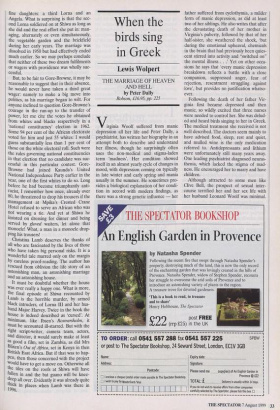Two wagers with providence
Robert Oakeshott
THE AFRICA HOUSE: THE TRUE STORY OF AN ENGLISH GENTLEMAN AND HIS AFRICAN DREAM by Christina Lamb Viking, £12.99, pp. 346
The walls are good and solid — almost three feet thick, and with plenty of antiques and paintings around as well as some Persian rugs on the floors, and it all looks opulent and ancient and established, not at all parvenu.
Stewart Gore-Browne, letter to his aunt Ethel, mid-1920s.
Spectator readers of my age may remem- ber the 'Castle Class' of steam locomotives which pulled most of the top trains on the old Great Western Railway during the war and in the early years after it. Most of the names in the class were those of actual cas- tles: Warwick, Conway and so on. But there were also a few manors, any number of halls, and the odd grange.
As the epigraph makes clear, the word 'House' in the title of Christina Lamb's enthralling biographical study of Stewart Gore-Browne does not begin to do justice to the awesome and magnificent — but also in some sense heroically absurd --- mansion which he built for himself during the 1920s, in the centre of an African estate of 23,000 acres, and at a place called Shiwa Ngandu. In the local language of the Bemba people, shiwa means lake and ngandu means royal crocodiles. As it had been when Livingstone passed that way on his last journey, the lake was still in Gore- Browne's time, and is to some extent even now, off the beaten track, deep in the bush of what was until 1964 Northern Rhode- sia's northern province and then became part of Zambia. I was lucky enough to visit the great 'House' (then simply called Shiwa) in 1965, two years before the death of its visionary builder. After a tower had been added in the 1930s, it might perhaps have been characterised as a 'fortified grange'. Though not an actual castle, it would unquestionably have qualified for castle class status by the criteria of the old GWR. In letters to Aunt Ethel, it was always called 'our castle in the woods'.
Gore-Browne lived a long and active life (1883 to 1967) and wore a monocle for most of it. After a distinguished record in the first world war, he performed notable public services in British Africa: first during the period of relatively stable colonial rule in Northern Rhodesia, during the 1930s and 1940s; second, more importantly, dur- ing the hectic and sometimes violent run- up to independence — when Northern Rhodesia became Zambia — in 1964. In the former case, he was knighted in 1945 for having represented African interests in the Protectorate's Legislative Council (Legco). About the latter, Kenneth Kaun- da, who led Zambia to independence, described him to Christine Lamb as
one of the most visionary people of Africa. I cannot think of any settler who made a simi- lar contribution to cutting across the racial boundary anywhere.
Put more generally, Gore-Browne was one of that small minority of whites in southern Africa who took the African side when white rule began to be seriously challenged. That took courage.
But, as her title tells us, the main focus of Christina Lamb's book is not the transi- tion to black rule in Zambia or Gore- Browne's political contribution more generally. She has judged, in my view right- ly, that the interest of the general reader is likely to be more engaged by at least two other aspects of his life: first, of course, by his extraordinary house and the associated estate; and, second, by his astonishing mar- 'Oh dear me. No, Stephanie — your parents.' riage. Quite apart from their separate sources of interest, each can be seen, I think, as being both dreams, to some extent realised, and colossal wagers with provi- dence. I have already introduced the 'castle in the woods' though not the various satel- lite enterprises designed to cover its costs. With the exception of the five years of the second war, costs were in fact alb-lost never covered. In the absence of generous and continuing subsidies, from Aunt Ethel dur- ing her lifetime and under her will after it, bankruptcy would not have been staved off. To be fair, the most successful of the satel- lite enterprises and the one responsible for the profits during the second war, namely essential oils, was destroyed not by poor husbandry or poor soil but by a dreaded virus. Still, by the economic test, the first wager was at best a partial success.
What of the wager (and dream) embod- ied in Gore-Browne's marriage? Its charac- ter may be sufficiently indicated if I explain that at the age of 44 he proposed to — and was accepted by — the 18-year-old daugh- ter of the deceased sweetheart of his early twenties. With the ambiguous exception of Aunt Ethel, he always thought of the moth- er as the true love of his life.
He first set eyes on young Lorna Gold- man at the funeral — not of her beloved mother (as I originally heard the story 30 years ago) — but of her grandmother. Her grandfather, Reginald Bosworth Smith, had been a friend of Thomas Hardy, and the funeral took place in Dorset in 1927. Young Lorna's father had been a doctor in South Africa and had died when she was quite young, 'supposedly as a result of doing experiments on himself `so damnably heroic' as Gore-Browne wrote in his diary. Her mother, after whom she took her name, had also died in South Africa, though both later and more naturally: of TB. She (the mother) was evidently most striking. For evidence we have a poem, 'Lorna the Second', written by Thomas Hardy and published, after her marriage to Gore-Browne, in 1928. I have space for no more than the first four and the last two lines:
Lorna! Yes, you are sweet, But you are not your mother, Lorna the First, frank, feat, Never such another...
Hence I mourn a loss, Loss ere you were born; a Lorna!
Gore-Browne's first encounter with Lorna II at her grandmother's funeral and her subsequent acceptance of his marriage proposal is fairytale stuff. But, using rather more robust language, it might also be described as a fine example of 'cradle snatching'. As well as prompting Hardy's poem the marriage seems to have attracted some criticism: Lady Grogan, sister of Lorna I, chose not to attend the wedding.
Was the second wager a win? Well, on the plus side the marriage produced two fine daughters: a third Lorna and an Angela. What is surprising is that the sec- ond Lorna soldiered on at Shiwa as long as she did and the real effort she put in: man- aging, alternately or even simultaneously, the vegetable garden and the brickfield during her early years. The marriage was dissolved in 1950 but had effectively ended much earlier. So we may perhaps conclude that neither of these two dream fulfilments or wagers with providence was wholly suc- cessful.
But, to be fair to Gore-Browne, it may be reasonable to suggest that in their absence, he would never have taken a third great wager: namely to make a big move into politics, as his marriage began to wilt. For anyone inclined to question Gore-Browne's courage in the run-up to the transfer of power, let me cite the votes he obtained from whites and blacks respectively in a 'national constituency' election in 1962. Some 94 per cent of the African electorate voted for him and just 55 whites: I would guess substantially less than 1 per cent of those on the white electoral roll. Such were the rules governing national constituencies in that election that no candidate was suc- cessful in this particular contest. Gore- Browne had joined Kaunda's United National Independence Party earlier in the year, one of the first whites to do so. Long before he had become triumphantly anti- racist, I remember how once, already over 80, he threatened to drop his trousers if the management at Mpika's Crested Crane Hotel refused to serve an African who was not wearing a tie. And yet at Shiwa he insisted on dressing for dinner and being served by gloved waiters, let alone that monocle! What, a man in a monocle drop- ping his trousers!
Christina Lamb deserves the thanks of all who are fascinated by the lives of those Who have taken big personal risks. It is a wonderful tale marred only on the margin by careless proof-reading. The author has rescued from oblivion the life story of an astonishing man, an astonishing marriage and an astonishing house. It must be doubtful whether the house was ever really a happy one. What is more, the final episode at Shiwa recounted by Lamb is the horrible murder, by armed black intruders, of Lorna III and her hus- band Major Harvey. Twice in the book the house is indeed described as 'cursed'. At ninnmum, like Ibsen's Rosmersholm, it must be accounted ill-starred. But with the right script-writer, camera team, actors, and director, it would surely make at least as.good a film, set in Zambia, as did Mrs plixen's Out of Africa, set in Kenya in then British East Africa. But if that was to hap- pen, then those concerned with the project would have to get a move on. Otherwise all the tiles on the roofs at Shiwa will have fallen in and the bat guano will be knee- deep all over. Evidently it was already quite thick in places when Lamb was there in 1996.



























































 Previous page
Previous page